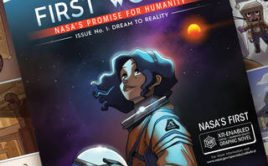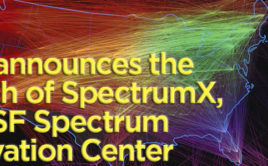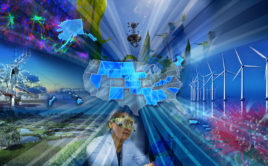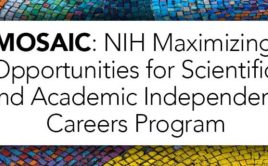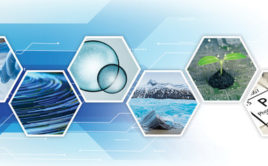News Archives: September, 2021
New NASA graphic novels and interactive experiences – First Woman
NASA released its first digital, interactive graphic novel on Saturday, Sept 25 in celebration of National Comic Book Day. “First Woman: NASA’s Promise for Humanity” tells the tale of Callie Rodriguez, the first woman to explore the Moon. While Callie is a fictional character, the first female astronaut and person of color will soon set foot on the Moon – a historic milestone and part of upcoming NASA missions. Through a series of graphic novels and digital platforms, First Woman aims to capture attention and unite the next generation of explorers who will return to the Moon. More
NSF builds scientific capacity at more than 20 minority-serving institutions in 12 states
NSF has invested more than $12 million in its Build and Broaden Program, which focuses on supporting research, offering training opportunities and creating greater research infrastructure at minority-serving institutions such as historically Black colleges and universities, Hispanic-serving institutions, and tribal colleges and universities.
NSF invests in mid-scale research infrastructure
NSF is investing in 10 mid-scale research infrastructure projects totaling $127 million. These infrastructure projects include designing next generation radars, superconducting magnets, ocean bottom seismographs, and internet security. Other projects include developing tools for studying the online behavior of people and the platforms they use, learning about underground ecosystems, and fabricating new types of integrated circuits to enable research to advance semiconductor technology.
Infrastructure projects funded in NSF EPSCoR jurisdictions include:
USDA NIFA Invests $10M for Food Safety Outreach, Training and Education
US Department of Agriculture’s (USDA) National Institute of Food and Agriculture (NIFA) has announced an investment of $10 million for 21 grants to develop and implement food safety and Food Safety Modernization Act-related training, education, extension outreach and technical assistance for food processors and farmers with small to mid-size operations.
Awards are made under three categories: Multistate Education and Training Projects, Community Outreach Projects and Collaborative Engagement Supplements. In FY 2021, NIFA made 13 Collaborative Education and Training Project awards, four Community Outreach Project awards and four Regional Center awards.
Projects funded in USDA NIFA (EPSCoR) jurisdictions include:
NSF announced the launch of SpectrumX, an NSF Spectrum Innovation Center
NSF has announced a $25 million investment over five years to launch SpectrumX, an NSF Spectrum Innovation Center that will address the growing demand for usage of the radio spectrum. This represents the first federal investment in a national center focused on the transformation of wireless spectrum management. SpectrumX is a coalition of 29 institutions led by the University of Notre Dame.
EPSCoR jurisdictions receive NSF investment to build R&D capacity and education
NSF has invested nearly $40 million in nine projects that fund collaborative networks, spanning a total of 20 institutions in 15 jurisdictions, through NSF's EPSCoR Research RII Track-2. EPSCoR is designed to build research and development capacity in states that demonstrate a commitment to research but have not received the levels of investment seen in other parts of the country. These grants focus on building interjurisdictional collaborative teams of investigators in scientific focus areas consistent with NSF and national priorities.
NIH NIGMS MOSAIC Scholars Annnounced
The purpose of the NIH MOSAIC Postdoc Career Transition Award to Promote Diversity (K99/R00) program is to support a cohort of early career, independent investigators from diverse backgrounds conducting research in NIH mission areas. The MOSAIC K99/R00 program is designed to facilitate a timely transition of promising postdoctoral researchers from diverse backgrounds from their mentored, postdoctoral research positions to independent, tenure-track or equivalent faculty positions at research-intensive institutions.
DOE Announces “Waves to Water” Desalination Prize Final Stage Finalists
The DOE has announced five winners in the CREATE Stage of the Waves to Water Prize, a competition focused on using the power of waves to develop clean energy-powered desalination technologies to help provide potable water to communities in need. CREATE is the fourth of the five-stage Waves to Water Prize, with total funds of up to $3.3M.
New NSF science and technology centers to address vexing societal problems
NSF has announced six new Science & Technologies Centers to advance ambitious, complex research in fields ranging from mechanobiology to particle physics to climate change. The centers will focus on establishing new scientific disciplines and developing transformative technologies that have the potential for broad impacts on science and society and will shine light on emerging STEM fields to develop a globally competitive STEM infrastructure and conduct outreach to inform the public of breakthrough science.
Of the six centers awarded, the following the only one with NSF EPSCoR jurisdictions:
NSF Center for Oldest Ice Exploration aims to transform the current understanding of Earth’s climate system by both discovering and recovering some of the oldest ice on the planet. The multidisciplinary team will drive this new science and discovery while building climate literacy and action in classrooms and communities across the United States.
The center is led by a team of researchers from Oregon State University; American Meteorological Society; Dartmouth College (New Hampshire); University of California, Berkeley; University of California, Irvine; University of California, San Diego; the University of Kansas; the University of Maine; The University of Texas, the University of Washington; University of Minnesota Duluth; University of Minnesota Twin Cities; Princeton University; Amherst College; and Brown University (Rhode Island).
Learn more
DOE Announces More Than $64 Million for Biofuels Research to Reduce Transportation Emissions
The DOE has announced more than $64 million in funding for 22 projects focused on developing technologies and processes that produce low-cost, low-carbon biofuels. Biofuels are made up of renewable resources and can power heavy-duty vehicles that are difficult to electrify with current technologies – including airplanes and ships – to help accelerate America’s path to a net-zero emissions economy by 2050.
